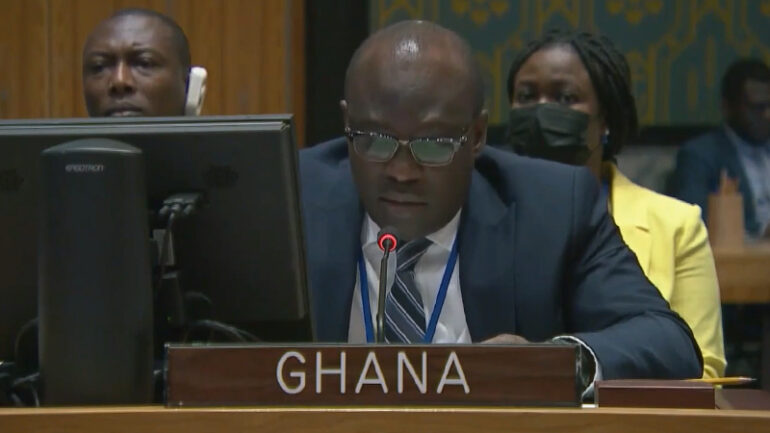Briefing on Covid-19 Vaccine Delivery Especially Barriers to Vaccination in Conflict Settings

- Posted by admin
- Posted in Statement & Remarks, UNSC
DURING A BRIEFING ON COVID-19 VACCINE DELIVERY, ESPECIALLY, BARRIERS TO VACCINATION IN CONFLICT SETTINGS (IMPLEMENTATION OF RESOLUTIONS 2532 (2020) AND 2565 (2021)
Mr. President,
I thank the UK delegation for picking up this agenda item during its Presidency. I also thank Ted Chaiban, Dr. Esperanza Martinez, and Dr. Emmanuel Ojwang for their unique perspectives about the vaccine delivery situation, especially as it relates to vaccination programmes in conflict settings.
The Council’s resolutions 2532 and 2565 demonstrated its concern over the impact of the COVID-19 pandemic in the maintenance of international peace and security. In mandated peacekeeping missions, but also in other conflict settings and humanitarian crisis, the resolutions called for urgent and coordinated actions to ameliorate the impact of the pandemic on key peace and security objectives. Notwithstanding the absence of compliance with the appeal for a global ceasefire called for by the Secretary-General or the durable humanitarian pause of consecutive 90-day periods advocated by the Council, we believe that, overall, and given the circumstances, the Organisation’s response to the pandemic in field missions was satisfactory in maintaining the safety of personnel. We also welcome evolving health advisories to TPCCs on the management of the COVID-19 pandemic based on available science.
Mr. President,
The Ukrainian crisis has overshadowed COVID-19 in the media space, but we all know that the pandemic continues to linger with devastating impacts on health systems, but also on the economies of nations and the developmental aspirations of many peoples. The pandemic has exposed underlying structural inequalities that drive conflict and instability and exacerbated the public health and socio-economic challenges of several countries, including their capacities to distribute vital public services such as vaccines and respond to the needs of marginalized and vulnerable groups. In countries already in conflict, the situation is even worse. Indeed, available statistics by the United Nations estimates that only about 13% of people in low-income countries have been vaccinated, compared with almost 70% in high-income countries. As bad as this situation is, it pales in comparison to the plight of millions of people in countries in armed conflict situations, post-conflict situations and humanitarian emergencies who are simply being overlooked by vaccination efforts. This is unacceptable and reflects a failure by the international community to administer vaccines in a fair and equitable manner.
The fulfilment of the mandate of resolution 2565, particularly, the provisions relating to humanitarian buffer, continues to be relevant in ensuring equitable access to vaccines to bring an end to this pandemic and help those countries prepare for the next pandemic. My delegation, therefore, calls on major stakeholders to address issues around vaccine liability; to streamline vaccine rollout in high-risk and vulnerable populations; and to provide funding for delivery operations. We also wish to urge countries to commit a portion of their vaccine supply to the humanitarian buffer that would be used to vaccinate people in countries experiencing humanitarian crisis.
In addition to the implementation of the humanitarian buffer, I wish to share a few thoughts, which, I believe, should form the basis for global co-operation to address the issue of vaccine equity in countries in armed conflict situations, post-conflict situations and humanitarian emergencies.
Firstly, we need to strengthen the funding of the existing global health organisations. This must include a greater, more predictable base of multilateral funding for the World Health organization (WHO) and Regional Centres of Disease Controls, which play the central roles in global health security. It will require dedicating an additional one percent (1%) of Gross Domestic Product (GDP) to funding global health. This is an investment in a global public good, not aid.
Secondly, COVID-19 vaccinations cannot be a standalone goal. The international community needs to take a common but differentiated approach and work to strengthen public health systems to ensure that vaccination is only one element of a broader health strategy which responds to the reality of peoples’ health needs and priorities.
Thirdly, there is the urgent need for the deconcentration of manufacturing capacities for vaccines, including in Africa where a significant number of conflict situations prevail, and distribution challenges persist. It is for this reason that countries such as Ghana, Rwanda, and Senegal, in partnership with the German biotechnology company, BioNTech SE are venturing into vaccine development and manufacturing to become hubs in sub-Saharan Africa. Ghana has committed $25 million to develop our domestic vaccine production capability and facilitate the capacity of domestic pharmaceutical companies to fill, finish and package mRNA COVID-19, malaria, tuberculosis, and other vaccines, as a first step towards vaccine production.
Fourthly, we must strengthen and support the existing mechanisms such as COVAX and the AU and AVATT initiatives which have played a vital role in the distribution of vaccines to vulnerable countries as well as countries in special situations including, those in armed conflict situations, post-conflict situations and humanitarian emergencies. We, in this regard, are heartened to learn that the COVAX mechanism has so far distributed over one billion vaccines to lower and middle-income countries.
Mr. President,
The pandemic has taught us that, national solutions to international problems simply do not work. Ghana, therefore, affirms its commitment to support Security Council Resolutions 2532 (2020) and 2565 (2021) and believes that through their successful implementation, vaccination can be successfully implemented in all settings, especially in conflict settings.
I thank you for your attention.
